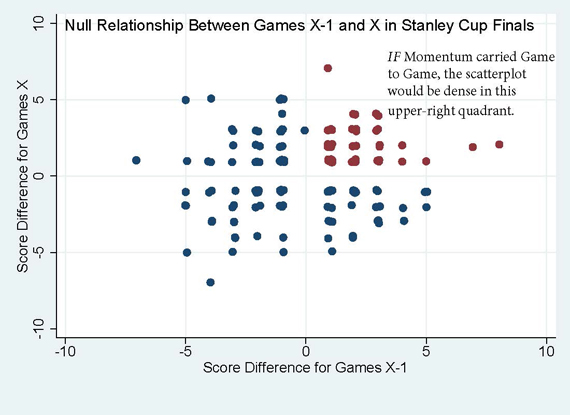Co-authored with Joakim Ryan
Who's going to be hotter -- the Tampa Bay Lightning or the Chicago Blackhawks?
Streakiness is one of the concepts -- like clutchness, choking, and luck -- that we often use to make sense of a multi-game series like the Stanley Cup Finals.
Does the evidence, though, support team-level momentum effects from one game to the next?
If there were such evidence, it would place a premium on starting strong in a series to take advantage of the cascading benefits.
On the other hand, maybe the whole idea has as much basis as the folktale that "the two-goal lead is the most dangerous in hockey." The evidence on that question is that -- even while there's a logic to the idea that teams that are (slightly) behind will take better risks -- the fact is that it's most typically better to gain a two-goal lead since such teams do not disproportionately lose.
For streakiness in pursuit of Lord Stanley's Cup, we looked at scores in the 203 NHL Finals contests that have been held since 1977 to see if winning a given game (Game X-1) helped predict the outcome of the subsequent game (Game X). To gain a fixed reference point, we calculated the score differential from the perspective of the team with Home Ice Advantage (for the series) and noted whether a specific game was played at home or away. If the Home-Advantage team won the first game of a series by, say, 3 goals, then - when looking at the outcome of the subsequent game (Game X), the value for "Game X-1" would be +3.
What we found is that (1) winning Game X-1 has no influence on winning the next one (Game X) and (2) winning Game X-1 by a large margin (e.g., running up the score) has no influence on the probability of winning the next one (Game X).

To illustrate how our Figure would look if there were -- hypothetically -- perfectly strong momentum from the start of a series, then all of the points in the scatterplot would be in the upper right quadrant. No one would ever expect that to be the case, but the "noise" in the Figure is clear when you see the comparably equal distribution across all four quadrants.
One limitation of our analysis is that we assume that the two teams in the Stanley Cup Finals are comparable with respect to overall quality. Given the great lengths required to make it to the Finals, that assumption seems fair.
In the affirmative, a re-assuring basis for our analysis is that it fits with the conclusion of a recent study of 6 years of Western Collegiate Hockey Association (WCHA) series where it was the routine scheduling format for the same two teams to play two nights in a row in the same arena. Wisconsin, for example, would play Anchorage-Alaska on a Friday and Saturday - with uniform start times - in Madison on one weekend; and, in Anchorage on another weekend. While the scheduling system was clearly motivated by needs for logistical efficiency, the WCHA schedule made it ripe for looking at the question of whether momentum effects exist from one game to the next.
As you can guess from our set-up, the 458 two-game series that were studied from the WCHA were able to incorporate a measure of team quality - season-specific conference records - and winning on a Friday night yielded no effect for the probability of winning the Game 2 on Saturday night. Further, running up the score in Game 1 didn't matter for retroactively predicting Game 2's outcome.
Of course, none of this is to say that games' outcomes are randomly determined; instead, the college hockey study (co-authored by one of us) suggests that apparent streaks are artifacts of good teams winning more often. In other words, when good teams win more often, it sometimes happens in bunches, making it seem like streakiness.
So, we can't know which team will win the next game based on the outcome of the prior game. Our analysis of the Finals did show, though, evidence of a different variable being important for the outcomes.
Specifically, and consistent with a different thread of conventional wisdom, the teams in our sample with Home Ice Advantage for the Finals won 67% (73 of 109) of their home games and 51% of their away games (48 of 94).
Streakiness, then, shouldn't offer hope to anyone engaged in the Cup Finals, but the numbers in support of Home Ice Advantage, which belongs to Tampa Bay's Bolts this year, meet both the analytics and eye (or folktale) tests.
Kevin Knifin (@KevinKniffin) teaches "Leadership and Management in Sports" at Cornell University as part of the Dyson School of Applied Economics and Management and studies mechanisms that optimize group performance.
Joakim Ryan (@JoakimRyan) is a 2015 graduate of Cornell University who recently signed a two-year entry-level contract with the San Jose Sharks after a decorated four-year career on the Big Red's Men's Ice Hockey team.